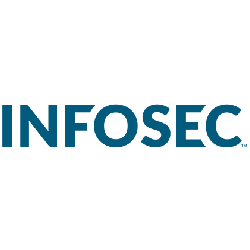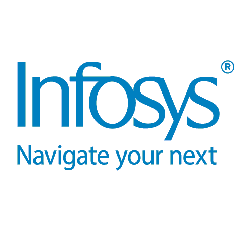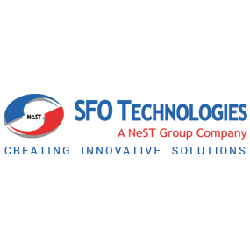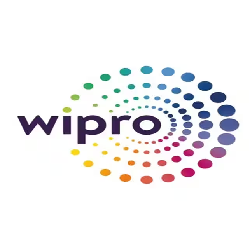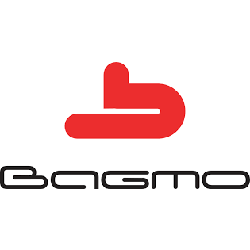Diploma in Computer Engineering
Home » Diploma in computer engineering
Diploma in Computer Engineering
Designed to meet the dynamic demands of both industry and society, our curriculum at the Computer Engineering Department focuses on nurturing professionals adept in facing real-world challenges. We provide a robust foundation in both software and hardware system design and analysis, blending innovative teaching with practical experience. This program is your gateway to becoming a key player in the field of technology, driving advancements and making impactful societal contributions.
Vision
Enhance the skills in the field of Computer Engineering by providing quality based education catering to the ever changing industrial demands and societal needs for a self-sustaining nation.
Mission
To facilitate the development of academic-industry collaborations and social outreach programmes.
To impart technical education for designing and developing software systems and to inculcate entrepreneurship skills.
To develop a positive attitude towards lifelong learning according to the demands of a versatile society.
Program Overview
The Computer Engineering Department at SCP, initiated in 2016, stands as a beacon of quality education in the field of computer technology. Offering a detailed three-year Diploma in Computer Engineering, our program is recognized by AICTE and maintains a deliberate annual intake of 30 students, ensuring a focused and enriching educational experience. The core mission of our department is to develop computer engineers who are globally competent and equipped to tackle industry challenges, achieved through a curriculum that emphasizes research and development, software development, hardware, networking and testing.
In line with our commitment to excellence, our educational approach is continuously enhanced through active industry engagement, fostering a learning environment that produces not only knowledgeable but also adept engineers. Our department is supported by a team of highly qualified and dynamic faculty members dedicated to motivating students via innovative projects and competitions. Since the department’s inception, we have been consistently nurturing computer engineers who excel in their field, with many securing positions in leading companies through our strong campus placement program.
Skilled Programmer’s Association in Computer Engineering (SP@CE)
SP@CE plays a vital role in fostering the academic and scientific development of the department’s student body. Some of the key activities organized by the SP@CE are Coding Competitions, Webpage designing competitions,Technical Workshops, Alumni talk etc..
List of Subjects
- Communication Skills in English
- Mathematics I
- Applied Physics I
- Applied Chemistry
- Engineering Graphics
- Applied Physics Lab
- Applied Chemistry Lab
- Introduction to IT systems Lab
- Engineering Workshop Practice
- Sports and Yoga
- Computer Organisation
- Programming in C
- Database Management Systems
- Digital Computer Fundamentals
- Programming in C Lab
- Database Management System lab
- Digital Computer Fundamentals Lab
- Web Technology lab
- Computer System Hardware Lab
- Project Management and Software Engineering
- Embedded Systems and Real Time Operating System Lab
- System Administration Lab
- Virtualisation Technology and Cloud Computing Lab
- Ethical Hacking
- Fundamentals of Artificial Intelligence and Machine Learning Lab
- Seminar
- Major Project
- Mathematics II
- Applied Physics II
- Environmental Science
- Fundamentals of Electrical & Electronics Engineering
- Problem Solving and Programming
- Communication Skills in English Lab
- Applied Physics Lab
- Fundamentals of Eletrical & Electronics Engineering Lab
- Problem Solving and Programming Lab
- Engineering Workshop Practice
- Object Oriented Programming
- Computer Communication and Networks
- Data Structures
- Community Skills in Indian knowledge system
- Object Oriented Programming Lab
- Web Programming Lab
- Data Structures Lab
- Application Development Lab
- Minor Project
- Entrepreneurship and Startup
- Internet of Things
- Server Administration
- Software Testing
- Introduction to IoT
- Fundamentals of Web Technology
- Multimedia
- Cloud Computing
- Indian Constitution
- Computer Network Engineering Lab
- Smart Device Programming Lab
- Internet of Things Lab
- Server Administration Lab
- Software Testing Lab
- Major Project
The external theory examination of all semesters shall be conducted by the University at the end of each semester. Internal evaluation is to be done by continuous assessment. For all courses without practical total marks of external examination is 80 and total marks of internal evaluation is 20. Marks distribution for external and internal assessments and the components for internal evaluation with their marks are shown below:
For all Courses without Practical
- Marks of external Examination: 80
- Marks of internal evaluation: 20
Components of Internal Evaluation of theory Marks
- Attendance: 5
- Assignment/Seminar/Viva: 5
- Test papers (2×5=10): 10
- Total: 20
For all Courses with Practical
- Marks for external evaluation is 60
- Marks for internal evaluation is 15.
Components of Internal Evaluation Marks
- Attendance: 5
- Assignment/Seminar/Viva: 2
- Test papers (2 x 4): 8
- Total: 15
Components Internal Evaluation of Practical
- Attendance: 2
- Test paper (1 x 4): 4
- Record: 4
- Total: 10
For Projects
- Marks of external evaluation: 80
- Marks of internal evaluation: 20
Assignments are to be done from 1st to 4th semesters. At least one assignment should be done in each semester for all courses.
A student shall present a seminar in the 5th semester for each paper and appear for viva-voce in the 6th semester for each course.
Two test papers are to be conducted in each semester for each course. The evaluations of all components are to be published and are to be acknowledged by the candidates. All documents of internal assessments are to be kept in the college for one year and shall be made available for verification by the University.
Syllabus
Best-in-class content by leading faculty and industry leaders in the form of videos, cases and projects.
Embark on a journey to master essential technical skills crucial in today’s tech-driven landscape. Delve into algorithmic thinking and network management through our immersive curriculum. Our program is designed to help you grasp both foundational and advanced competencies, setting you up for success in a world where technology is constantly evolving.
This course is the ideal starting point for those passionate about technology, coding and solving complex problems. It’s perfectly suited for aspiring individuals eager to shape the digital future and commence their careers in the dynamic fields of computing and engineering. If you are ready to turn your passion into a professional journey, this program is tailored for you.
Affiliations & Accreditations

Government Of Kerala

The International Certification Network.
Faculty
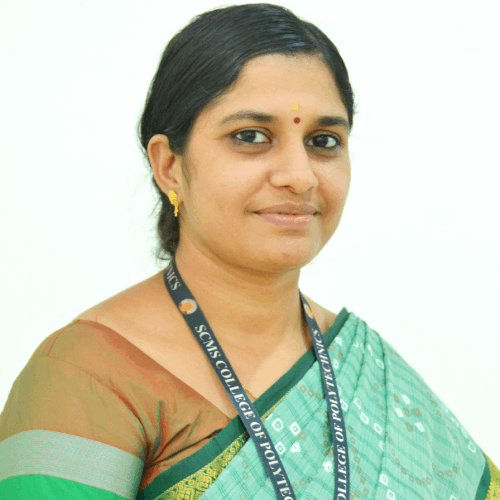
Greeshma A k
Head of Department
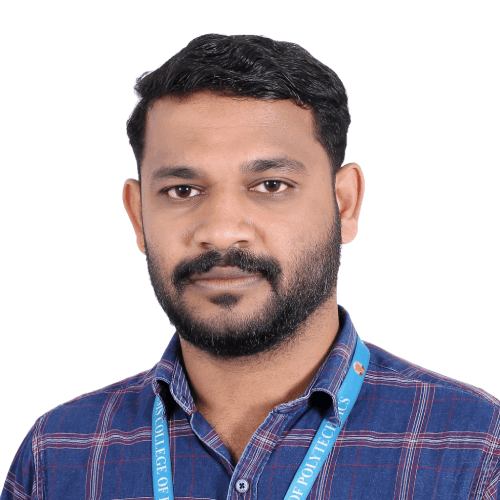
Midhun Mohan
Lab Instructor

Dhanya Sree MS
Lecturer

Afrina Noushad
Lecturer
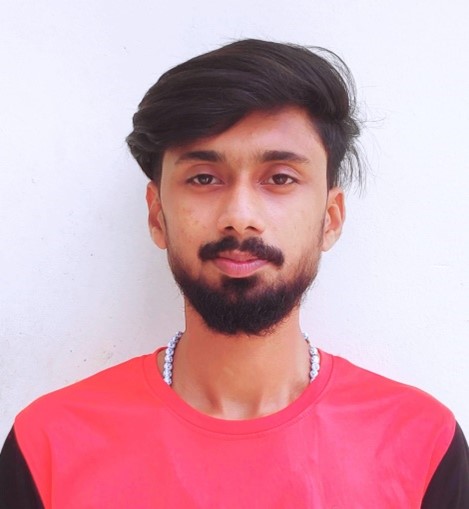
Mr. Sooraj K J
Lecturer
Objectives and Outcomes
| PEO1 | To apply fundamentals of mathematics, science and engineering to solve the real time problems and inculcate high professionalism by providing technical and soft skills |
| PEO2 | Train the students in diversified and applied areas of computer engineering emphasizing analysis and design to create software solutions that can meet current industrial and societal needs. |
| PEO3 | Attain the ability to adapt quickly to new environments, emerging technologies and working in distinct areas with a strong focus on innovation and entrepreneurship. |
| PEO4 | Develop technicians with solid foundation for real time operation and maintenance of computer hardware and networking. |
| PEO5 | The student will have an inclination towards life- long learning and responsibilities to remain current in their profession to foster personal and organizational growth. |
| PSO1 | Apply the knowledge of computer science skills, modern tools, and mathematical methodologies to analyze, develop, and simulate complex systems. |
| PSO2 | Compile acquired knowledge in computer engineering to take up challenges and manage critical scenarios to create innovative career paths. |
| PSO3 | The ability to develop innovative products in the field of computer engineering to meet the societal needs thereby evolving as an eminent entrepreneur. |
| PO1 | Basic and Discipline specific knowledge: Apply knowledge of basic mathematics, science and engineering fundamentals and engineering specialization to solve the engineering problems. |
| PO2 | Problem analysis: Identify and analyse well-defined engineering problems using codified standard methods. |
| PO3 | Design/development of solutions: Design solutions for well-defined technical problems and assist with the design of systems components or processes to meet specified needs. |
| PO4 | Engineering Tools, Experimentation and Testing: Apply modern engineering tools and appropriate technique to conduct standard tests and measurements. Apply modern engineering tools and appropriate technique to conduct standard tests and measurements. |
| PO5 | Engineering practices for society, sustainability and environment: Apply appropriate technology in context of society, sustainability, environment and ethical practices. |
| PO6 | Project Management: Use engineering management principles individually, as a team member or a leader to manage projects and effectively communicate about well-defined engineering activities. |
| PO7 | Life-long learning: Ability to analyse individual needs and engage in updating in the context of technological change. |
| PEO1 | To apply fundamentals of mathematics, science and engineering to solve the real time problems and inculcate high professionalism by providing technical and soft skills |
| PEO2 | Train the students in diversified and applied areas of computer engineering emphasizing analysis and design to create software solutions that can meet current industrial and societal needs. |
| PEO3 | Attain the ability to adapt quickly to new environments, emerging technologies and working in distinct areas with a strong focus on innovation and entrepreneurship. |
| PEO4 | Develop technicians with solid foundation for real time operation and maintenance of computer hardware and networking. |
| PEO5 | The student will have an inclination towards life- long learning and responsibilities to remain current in their profession to foster personal and organizational growth. |
| PSO1 | Apply the knowledge of computer science skills, modern tools, and mathematical methodologies to analyze, develop, and simulate complex systems. |
| PSO2 | Compile acquired knowledge in computer engineering to take up challenges and manage critical scenarios to create innovative career paths. |
| PSO3 | The ability to develop innovative products in the field of computer engineering to meet the societal needs thereby evolving as an eminent entrepreneur. |
| PO1 | Basic and Discipline specific knowledge: Apply knowledge of basic mathematics, science and engineering fundamentals and engineering specialization to solve the engineering problems. |
| PO2 | Problem analysis: Identify and analyse well-defined engineering problems using codified standard methods. |
| PO3 | Design/ development of solutions: Design solutions for well-defined technical problems and assist with the design of systems components or processes to meet specified needs. |
| PO4 | Engineering Tools, Experimentation and Testing: Apply modern engineering tools and appropriate technique to conduct standard tests and measurements. |
| PO5 | Engineering practices for society, sustainability and environment: Apply appropriate technology in context of society, sustainability, environment and ethical practices. |
| PO6 | Project Management: Use engineering management principles individually, as a team member or a leader to manage projects and effectively communicate about well-defined engineering activities. |
| PO7 | Life-long learning: Ability to analyse individual needs and engage in updating in the context of technological changes. |
Electrical Engineering Students Association (EESA)
Admissions
Eligibility
- The candidate shall be a citizen of India.
- The candidate shall have passed SSLC/THSLC or equivalent examination, with eligibility for higher studies.
- Candidates who have passed qualifying examination with Mathematics, English and
- A candidate who has taken more than two chances to secure eligibility for higher studies in SSLC/THSLC or equivalent examinations is not eligible for admission
- For CBSE/ICSE/Open school candidates the Marks/Grades obtained in Science is considered for calculating grade in the place of Physics and Chemistry. CBSE school candidates who have passed qualifying examination with Mathematics- Standard are only eligible to apply .
- In the case of CBSE candidates, only the certificates of Board examination shall be accepted as qualifying certificate and such candidates shall submit an undertaking. This undertaking need only be submitted by candidates who have passed CBSE Xth during the period 2010-2018
*Please refer the prospectus issued by SBTE Kerala
Two-year Lateral Entry Diploma
The candidate should satisfy all eligibility requirements mentioned in the DTE prospectus.
Minimum Eligibility: +2/VHSE candidates: Minimum score of 50% in Mathematics, Physics and other relevant mandatory subjects put together. In the case of VHSE, candidate should have separate pass in Physics, Mathematics or additional mathematics and other relevant subjects.
NCVT/SCVT/KGCE candidates: Pass with 50% aggregate marks in 2 year metric courses of NCVT/SCVT/ KGCE.Candidates will be considered for admission to any branch of Engineering and Technology.
How to Apply?
You may apply online by filling the application from the website.
Application fee of Rs.200/- also to be paid online. The application has to be accompanied with the following
documents:
- True copies (Self attested) of Mark Sheet of SSLC/HSE/CBSE/ICSE/ITI or equivalent examination.
- The original certificates should be presented to the Principal at the time of admission. They will be returned to the students only after verifications. Students are requested to keep sufficient number of attested copies of certificates for their use till such time.
Our Placements
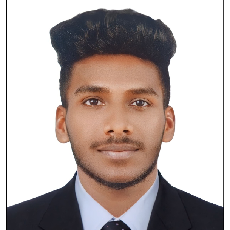
ISSAC SHAJI
COMPUTER ENGINEERING
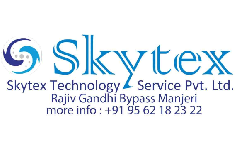
Skytex Technology Pvt.Ltd
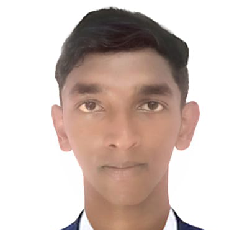
SREERAG SASI
COMPUTER ENGINEERING

CIE Automotive India
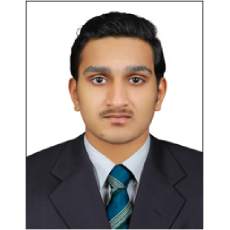
ANADHAVISHNU K S
COMPUTER ENGINEERING
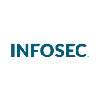
INFOSEC SOLUTIONS PRIVATE LIMITED,KOCHI

NAVEEN SIBY
COMPUTER ENGINEERING

TEKSOL IT SOLUTIONS PRIVATE LIMITED

SAJAD K H
COMPUTER ENGINEERING
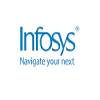
INFOSYS

ALBE MARIA JOY
COMPUTER ENGINEERING

WIPRO

ANEES MUHAMEED
COMPUTER ENGINEERING

Bagmo Private Limited, Kochi

ABHIJITH P S
COMPUTER ENGINEERING
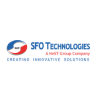
SFO Technologies

SIVAPRASAD K B
COMPUTER ENGINEERING

SFO Technologies

EMMANUEL PAUL
COMPUTER ENGINEERING

SFO Technologies

JUDESON JACOBL
COMPUTER ENGINEERING

SFO Technologies
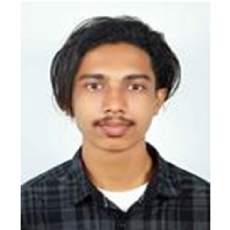
ADITHYAN VS
COMPUTER ENGINEERING

SFO Technologies

ANOOP SAJU
COMPUTER ENGINEERING

SFO Technologies
Ready to Engineer Your Future?
Begin Your Journey with Us
Why Study at SCMS ?
SCMS is led by a dedicated team of leaders who provide guidance, support, and drive the institute’s mission of academic excellence and research-driven education.
Alongside the core curriculum, SCMS emphasizes the development of managerial and technological skills, equipping you with a well-rounded education that prepares you for the challenges of the professional world.
SCMS boasts a committed faculty team comprising experienced professors, researchers, and industry experts who provide quality education, mentorship, and guidance throughout your academic journey.
SCMS maintains a disciplined environment that fosters a strong focus on academic pursuits, creating an atmosphere conducive to learning, research, and personal growth.
Interaction of faculty, parents and students arranged each semester to assess the learning difficulties of individual students, if any, and to chalk out remedial programmes to improve their performance.
SCMS offers a valuable educational experience with its well-designed curriculum, research opportunities, industry collaborations, and career support services, ensuring that your investment in education yields long-term benefits for your future.
SCMS provides modern laboratories, advanced equipment, and research facilities, ensuring you have access to cutting-edge resources for hands-on learning and research.
Our Alumni's Career Footprints




